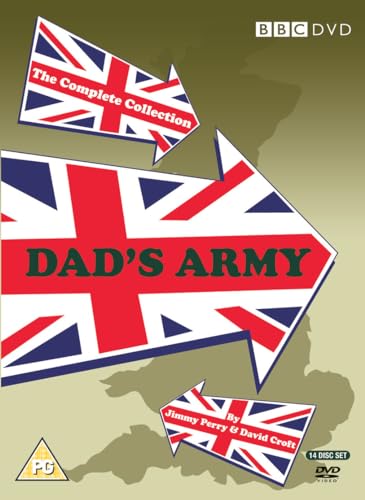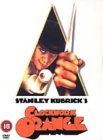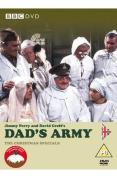 Dad's Army - The Complete Collection | DVD | (06/10/2014)
from £19.99
| Saving you £N/A (N/A%)
| RRP
Dad's Army - The Complete Collection | DVD | (06/10/2014)
from £19.99
| Saving you £N/A (N/A%)
| RRP  Dad's Army - Complete Series And Specials | DVD | (29/10/2007)
from £29.99
| Saving you £-8.00 (N/A%)
| RRP
Dad's Army - Complete Series And Specials | DVD | (29/10/2007)
from £29.99
| Saving you £-8.00 (N/A%)
| RRP All the episodes and Christmas Specials.
![A Clockwork Orange [Blu-ray] [1971]](/pictures/1080452.jpg) A Clockwork Orange | Blu Ray | (03/03/2008)
from £8.75
| Saving you £16.24 (185.60%)
| RRP
A Clockwork Orange | Blu Ray | (03/03/2008)
from £8.75
| Saving you £16.24 (185.60%)
| RRP Stomping whomping stealing singing tap-dancing violating Derby-topped teddy-boy hooligan Alex (Malcolm McDowell) has his own way of having a good time. He has it at the tragic expense of others. Alex's journey from amoral punk to brainwashed proper citizen forms the dynamic arc of Stanley Kubrick's future-shook vision of Anthony Burgess's novel. Unforgettable images startling musical counterpoints the fascinating language used by Alex and his pals - Kubrick shapes them into a shattering whole.
 A Clockwork Orange | DVD | (17/04/2019)
from £10.35
| Saving you £3.64 (35.17%)
| RRP
A Clockwork Orange | DVD | (17/04/2019)
from £10.35
| Saving you £3.64 (35.17%)
| RRP The controversy that surrounded Stanley Kubrick's adaptation of Anthony Burgess's dystopian novel A Clockwork Orange while the film was out of circulation suggested that it was like Romper Stomper: a glamorisation of the violent, virile lifestyle of its teenage protagonist, with a hypocritical gloss of condemnation to mask delight in rape and ultra-violence. Actually, it is as fable-like and abstract as The Pilgrim's Progress, with characters deliberately played as goonish sitcom creations. The anarchic rampage of Alex (Malcolm McDowell), a bowler-hatted juvenile delinquent of the future, is all over at the end of the first act. Apprehended by equally brutal authorities, he changes from defiant thug to cringing bootlicker, volunteering for a behaviourist experiment that removes his capacity to do evil.It's all stylised: from Burgess' invented pidgin Russian (snarled unforgettably by McDowell) to 2001-style slow tracks through sculpturally perfect sets (as with many Kubrick movies, the story could be told through decor alone) and exaggerated, grotesque performances on a par with those of Dr Strangelove (especially from Patrick Magee and Aubrey Morris). Made in 1971, based on a novel from 1962, A Clockwork Orange resonates across the years. Its future is now quaint, with Magee pecking out "subversive literature" on a giant IBM typewriter and "lovely, lovely Ludwig Van" on mini-cassette tapes. However, the world of "Municipal Flat Block 18A, Linear North" is very much with us: a housing estate where classical murals are obscenely vandalised, passers-by are rare and yobs loll about with nothing better to do than hurt people. On the DVD: The extras are skimpy, with just an impressionist trailer in the style of the film used to brainwash Alex and a list of awards for which Clockwork Orange was nominated and awarded. The box promises soundtracks in English, French and Italian and subtitles in ten languages, but the disc just has two English soundtracks (mono and Dolby Surround 5.1) and two sets of English subtitles. The terrific-looking "digitally restored and remastered" print is letterboxed at 1.66:1 and on a widescreen TV plays best at 14:9. The film looks as good as it ever has, with rich stable colours (especially and appropriately the orangey-red of the credits and the blood) and a clarity that highlights previously unnoticed details such as Alex's gouged eyeball cufflinks and enables you to read the newspaper articles which flash by. The 5.1 soundtrack option is amazingly rich, benefiting the nuances of performance as much as the classical/electronic music score and the subtly unsettling sound effects. --Kim Newman
![Yellow Submarine [Blu-ray]](/pictures/1115759.jpg) Yellow Submarine | Blu Ray | (04/06/2012)
from £22.39
| Saving you £-1.40 (N/A%)
| RRP
Yellow Submarine | Blu Ray | (04/06/2012)
from £22.39
| Saving you £-1.40 (N/A%)
| RRP Once upon a time, or maybe twice, there was an unearthly paradise called Pepperland; a place where happiness and music reigned supreme. But all that was threatened when the terrible Blue Meanies declared war and sent in their army led by a menacing Flying Glove to destroy all that was good. Enter, John, Paul, George and Ringo to save the day! Armed with little more than their humour, songs, and of course, their yellow submarine, the Fab Four tackle the rough seas ahead in an effort to bring down the evil forces of bluedom.
![Dad's Army: The Missing Episodes [DVD]](/pictures/1164316.jpg) Dad's Army: The Missing Episodes | DVD | (27/11/2023)
from £9.99
| Saving you £N/A (N/A%)
| RRP
Dad's Army: The Missing Episodes | DVD | (27/11/2023)
from £9.99
| Saving you £N/A (N/A%)
| RRP Between 1968 and 1977, the BBC broadcast 84 television episodes of 'Dad's Army'. Across nine seasons and seven Christmas specials, the programme continues to be one of the most beloved of all British sitcoms. However, not every episode of 'Dad's Army' still survives in its original format. Five episodes were never formally archived by the BBC and are today presumed lost. No footage is known to exist from any of these episodes. They are collectively some of the most sought-after of all lost television programmes. Happily, audio-only recordings have survived of all five of these lost classics. These audio recordings (starring Arthur Lowe, John Le Mesurier and Clive Dunn) have been painstakingly reassembled and restored and are now used as the basis for a series of new animated episodes of 'Dad's Army' - featuring all new hand-drawn black and white animation, synced up to the words of the original actors. These new animated episodes give audiences a chance to enjoy five original episodes of this much-loved comedy classic for the first time in over fifty-years.
![A Clockwork Orange [4K Ultra HD] [1971] [Blu-ray] [Region Free]](/pictures/1156639.jpg) A Clockwork Orange | Blu Ray | (04/10/2021)
from £21.98
| Saving you £N/A (N/A%)
| RRP
A Clockwork Orange | Blu Ray | (04/10/2021)
from £21.98
| Saving you £N/A (N/A%)
| RRP Stomping, whomping, stealing, singing, tap dancing, violating. Derby-topped hooligan Alex (Malcolm McDowell) has a good time - at the tragic expense of others. His journey from amoral dynamic arc of Stanley Kubrick's future-shock vision of Anothony Burgess' novel. Controversial when first released, A Clockwork Orange won New York Film Critics Best Picture and Director awards and earned four Oscar nominations, including Best Picture. Its power still entices, shocks and holds us in its grasp. Special Features Commentary by Malcolm McDowell and Historian Nick Redman Channel Four Documentary Still Tickin': The Return of Clockwork Orange Featurette Great Bolshy Yarblockos!: Making A Clockwork Orange Featurette Turning Like Clockwork Featurette Malcolm McDowell Looks Back Theatrical Trailer Note: Only 4K Disc is Region Free
![Shrek 1 & 2 Box Set [2004]](/pictures/1007450.jpg) Shrek 1 & 2 Box Set | DVD | (01/11/2004)
from £14.14
| Saving you £18.85 (133.31%)
| RRP
Shrek 1 & 2 Box Set | DVD | (01/11/2004)
from £14.14
| Saving you £18.85 (133.31%)
| RRP Both of the hit animated movies in one package. Full of verve and wit, Shrek is a computer-animated adaptation of William Steig's delightfully fractured fairy tale. Our title character (voiced by Mike Myers) is an agreeable enough ogre who wants to live his days in peace. When the diminutive Lord Farquaad (John Lithgow) evicts local fairy tale creatures (including the now-famous Seven Dwarfs, Pinocchio and the Gingerbread Man), they settle in the ogre's swamp and Shrek wants answers from Farquaad. A quest of sorts starts for Shrek and his new pal, a talking donkey (Eddie Murphy), where battles have to be won and a princess (Cameron Diaz) must be rescued from a dragon lair in a thrilling action sequence. The story is stronger than most animated fare but it's the jokes that make Shrek a winner. The PG rating is stretched when Murphy and Myers hit their strides. The mild potty humour is fun enough for the 10-year-old but will never embarrass their parents. Shrek is never as warm and inspired as the Toy Story films, but the realistic computer animation and a rollicking soundtrack keeps the entertainment in fine form. Produced by DreamWorks, the film also takes several delicious stabs at its cross-town rival, Disney. --Doug Thomas In Shrek 2, the newlywed Shrek and Princess Fiona are invited to Fiona's former kingdom, Far Far Away, to have their marriage blessed by Fiona's parents--which Shrek thinks is a bad, bad idea, and he's proved right: the parents are horrified by their daughter's transformation into an ogress, a fairy godmother wants her son Prince Charming to win Fiona, and a feline assassin is hired to get Shrek out of the way. The computer animation is more detailed than ever, but it's the acting that make the comedy work--in addition to the return of Mike Myers, Eddie Murphy, and Cameron Diaz, Shrek 2 features the flexible voices of Julie Andrews, John Cleese and Antonio Banderas, plus Jennifer Saunders as the gleefully wicked fairy godmother. --Bret Fetzer
![Yellow Submarine [DVD]](/pictures/1115716.jpg) Yellow Submarine | DVD | (04/06/2012)
from £15.29
| Saving you £2.70 (17.66%)
| RRP
Yellow Submarine | DVD | (04/06/2012)
from £15.29
| Saving you £2.70 (17.66%)
| RRP Once upon a time, or maybe twice, there was an unearthly paradise called Pepperland; a place where happiness and music reigned supreme. But all that was threatened when the terrible Blue Meanies declared war and sent in their army led by a menacing Flying Glove to destroy all that was good. Enter, John, Paul, George and Ringo to save the day! Armed with little more than their humour, songs, and of course, their yellow submarine, the Fab Four tackle the rough seas ahead in an effort to bring down the evil forces of bluedom.
 Richard III | DVD | (06/02/2006)
from £7.99
| Saving you £7.00 (87.61%)
| RRP
Richard III | DVD | (06/02/2006)
from £7.99
| Saving you £7.00 (87.61%)
| RRP ""Why I can smile and murder while I smile And cry 'Content' to that which grieves my heart And wet my cheeks with artificial tears And frame my face to all occasions..."" Soon after Edward IV is crowned King his brother Richard a hunchback twisted in mind as well as body starts scheming for the throne of England. He woos and wins Lady Anne and then poisons Edward's mind against their brother Clarence later organising his death. But even after his coronation
![Dombey and Son - Charles Dickens Classics [1969] [DVD] BBC TV Series](/pictures/1144018.jpg) Dombey and Son - Charles Dickens Classics | DVD | (03/07/2017)
from £15.10
| Saving you £N/A (N/A%)
| RRP
Dombey and Son - Charles Dickens Classics | DVD | (03/07/2017)
from £15.10
| Saving you £N/A (N/A%)
| RRP The first BBC television adaptation of the Charles Dickens classic, Dombey and Son (1969) is now available for the first time to own on DVD. Starring John Carson, Kara Wilson, William Moore and Clive Swift. Hugh Leonard s third Dickens adaptation for the BBC, first broadcast in 1969, is an absorbing portrayal of proud logic undone by staunch affection. The timeless story of a father s blinkered pride, public downfall and emotional rescue. Paul Dombey (John Carson) is the wealthy owner of a shipping company whose sole desire is to have a son to inherit the family firm. But when a son arrives, his wife dies soon after, and the sickly boy s own days are numbered. Dombey finds no solace in the affections of his elder child Florence (Kara Wilson). He sees little use in daughters in the business world. Encouraged by the sinister Major Bagstock (Clive Swift), Dombey enters into a second, loveless marriage with Edith Grainger (Sally Home), who eventually flees to France with Dombey s double-dealing business manager James Carker (Gary Raymond). Dombey s livelihood is further undermined by a burgeoning railway network. All seems lost unless his pride will allow him to salvage a relationship with Florence. The colourful characters also include put-upon clerk Walter Gay (Derek Seaton), retired sea-captain Cuttle (William Moore), scatterbrained Mr Toots (Christopher Sandford), Florence s faithful maid Susan Nipper (Helen Fraser), Dombey s fusspot sister Louisa Chick (Hilda Braid) and the spurned but loyal Lucretia Tox (Pat Coombs).
![The Italian Job [1969]](/pictures/1002236.jpg) The Italian Job | DVD | (26/08/2002)
from £N/A
| Saving you £N/A (N/A%)
| RRP
The Italian Job | DVD | (26/08/2002)
from £N/A
| Saving you £N/A (N/A%)
| RRP Michael Caine stars in this 60s classic as the leader of a team of thieves who plan to use minis to help them perform the heist of the century.
 Bulldog Drummond Comes Back | DVD | (01/09/2003)
from £N/A
| Saving you £N/A (N/A%)
| RRP
Bulldog Drummond Comes Back | DVD | (01/09/2003)
from £N/A
| Saving you £N/A (N/A%)
| RRP ![The Four Feathers [1939]](/pictures/1002733.jpg) The Four Feathers | DVD | (19/06/2007)
from £6.29
| Saving you £3.70 (58.82%)
| RRP
The Four Feathers | DVD | (19/06/2007)
from £6.29
| Saving you £3.70 (58.82%)
| RRP Far too many film versions of the The Four Feathers have been made over the years, which is especially surprising considering that this 1939 Korda brothers production is surely definitive. The film simultaneously celebrates and pokes fun at British imperialism, showing the kind of dogged stiff-upper-lippery that forged an empire, but also the blinkered attitudes and crass snobbishness of the ruling classes (and those plummy accents--did people ever really talk like that?). Whatever political subtext may or may not be read into it, though, the film is best celebrated for its magnificent vistas: partially made on location in the Sudan, as well as at the famous Denham Studios, this is British cinema from the days when it thought to rival Hollywood for sheer spectacle. Vincent Korda's production design and the glorious early colour cinematography are helped greatly by fellow Hungarian émigré Miklos Rozsa's epic score. John Clements is the notional hero, the man who is determined to show the world he is not a coward after resigning his commission (even though it would surely have saved everyone a lot of bother if he had just stuck with it) but the film is stolen by Ralph Richardson, magnificent as an officer struck blind and led to safety by Clements' Harry Faversham. The latter scenes when Richardson's Captain Durrance realises the truth and its implications are the most poignant and emotionally truthful in the film. C Aubrey Smith is delightful as the old buffer who relives his battles on the dinner table; to a modern audience, however, the "blackface" casting of John Laurie as the Khalifa strikes a discordant note. But adjusting some expectations for its vintage, this is a triumph of derring-do and far and away the most gripping version of this oft-told story on film. --Mark Walker
![The Lavender Hill Mob [1951]](/pictures/1011823.jpg) The Lavender Hill Mob | DVD | (21/06/2004)
from £6.10
| Saving you £10.89 (178.52%)
| RRP
The Lavender Hill Mob | DVD | (21/06/2004)
from £6.10
| Saving you £10.89 (178.52%)
| RRP Directed by Charles Crichton, who would much later direct John Cleese in A Fish Called Wanda (1988), 1951's The Lavender Hill Mob is the most ruefully thrilling of the Ealing Comedies. Alec Guinness plays a bowler-hatted escort of bullion to the refineries. His seeming timidity, weak 'r's and punctiliousness mask a typically Guinness-like patient cunning. "I was aware I was widiculed but that was pwecisely the effect I was stwiving to achieve". He's actually plotting a heist. With more conventionally cockney villains Sid James and Alfie Bass in tow, as well as the respectable but ruined Stanley Holloway, Guinness' perfect criminal plan works in exquisite detail, then unravels just as exquisitely, culminating in a nail-biting police car chase in which you can't help rooting for the villains. The Lavender Hill Mob depicts a London still up to its knees in rubble from World War II, a world of new hope but continued austerity, a budding new order in which everything seems up for grabs; as such it could be regarded as a lighter hearted cinematic cousin to Carol Reed's 1949 masterpiece The Third Man. The Lavender Hill Mob also sees the first, fleeting on-screen appearance of Audrey Hepburn in the opening sequence. --David Stubbs
![Dad's Army - The Complete Series 1 And The Lost Episodes Of Series 2 [1968]](/pictures/1011621.jpg) Dad's Army - The Complete Series 1 And The Lost Episodes Of Series 2 | DVD | (13/09/2004)
from £6.95
| Saving you £9.04 (130.07%)
| RRP
Dad's Army - The Complete Series 1 And The Lost Episodes Of Series 2 | DVD | (13/09/2004)
from £6.95
| Saving you £9.04 (130.07%)
| RRP Classic TV comedy from the Home Guards at Walmington-On-Sea who are both bumbling and ineffectual as well as incompetent which makes life chaotic for all around! Originally transmitted in 1968 (and recently voted no.4 in Britain's Best Sitcom) this DVD release contains all of the first series followed by the surviving episodes of the second series. Unfortunately the other three instalments remain missing and presumed lost forever... Episodes from Series 1: The Man And The Hour:
![Dad's Army: The Movie [1971]](/pictures/1014379.jpg) Dad's Army: The Movie | DVD | (16/08/2004)
from £4.96
| Saving you £7.03 (141.73%)
| RRP
Dad's Army: The Movie | DVD | (16/08/2004)
from £4.96
| Saving you £7.03 (141.73%)
| RRP In the 1970s the British film industry went through a craze for turning hit TV comedies into big screen features. From On the Buses (1971) to Porridge (1979), Dad's Army was one of the few which made the transition with style. Set in the small south coast town of Walmington-on-Sea in 1940, the film does have the structure of three TV episodes remade and sequenced together. Beginning with the formation of the local Home Guard, the company has a self-contained adventure on military manoeuvres, before a finale which allows for some heroism as three German officers take over the church hall. Dad's Army has all the gentle character comedy of the classic BBC TV series, benefiting enormously by retaining the entire television cast, headed by the incomparable Arthur Lowe as the blustering Captain Mainwaring and supported by the equally wonderful John Le Mesurier and Clive Dunn. The cinema budget allows far superior production values to the original series, with a loving re-creation of 1940's England and some surprisingly beautiful cinematography. Above all, the film is both funny and a nostalgic reminder of a time when ordinary middle-aged and old men could be both real and movie heroes. --Gary S. Dalkin
![Valerian 3D & 2D BD [Blu-ray] [2019]](/pictures/1151748.jpg) Valerian 3D & 2D BD | Blu Ray | (27/11/2017)
from £13.79
| Saving you £N/A (N/A%)
| RRP
Valerian 3D & 2D BD | Blu Ray | (27/11/2017)
from £13.79
| Saving you £N/A (N/A%)
| RRP  Dad's Army - Christmas Special | DVD | (12/11/2007)
from £4.70
| Saving you £11.29 (240.21%)
| RRP
Dad's Army - Christmas Special | DVD | (12/11/2007)
from £4.70
| Saving you £11.29 (240.21%)
| RRP Episodes Comprise: 1. A happy wartime Christmas often meant pooling coupons even for simple festive fare such as shortbread biscuits and shelter cake. 2. Captain Mainwaring arranges for a sherry party for local dignitaries but during the festivities an unwelcome guest arrives. 3. As Christmas is coming the Vicar decides to hold a bazaar to raise money for comforts for troops on active duty and he asks for contributions from the troop.
![Dad's Army [Blu-ray] [1971]](/pictures/1154907.jpg) Dad's Army | Blu Ray | (14/06/2021)
from £9.99
| Saving you £N/A (N/A%)
| RRP
Dad's Army | Blu Ray | (14/06/2021)
from £9.99
| Saving you £N/A (N/A%)
| RRP First time on Blu-Ray in the UK. The film spin-off from the much-loved TV comedy series starring Arthur Lowe as the commander of an incompetent Home Guard platoon in wartime Britain. With the trusted comedy genius from the TV series shining through, Mainwaring and company save the day when a crew of a German aircraft take the vicar and villagers hostage in the church.

Please wait. Loading...
This site uses cookies.
More details in our privacy policy